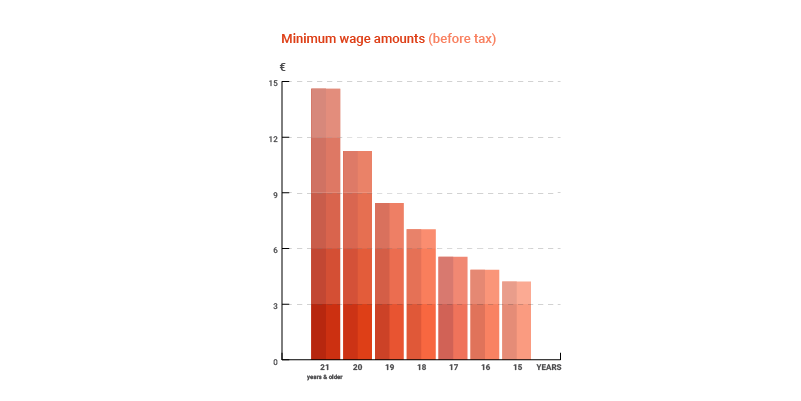As the Netherlands enforces significant payroll and labor law updates in 2025, businesses must adapt quickly to ensure compliance and avoid financial penalties. These changes impact minimum wage levels, worker classification, remote work allowances, and environmental reporting requirements. Staying ahead of these developments not only minimizes legal risks but also strengthens workforce relations and operational efficiency.

1. Dutch Minimum Wage Increase 2025
The Government of the Netherlands has announced that starting from January 1, 2025, the Dutch minimum wage has increased by 2.75%, reaching €14.06 per hour for employees aged 21 and older. This mandatory adjustment applies across all industries, regardless of collective bargaining agreements (CAO).
Implementation Requirements:
Immediate Payroll Updates: Verify your payroll system reflects the new wage rates.
Compensation Review: Analyze your entire salary structure to maintain internal equity.
Budget Planning: Incorporate increased labor costs into your 2025 financial projections.
2. Worker Classification Enforcement in the Netherlands
The Dutch Tax Authority (Belastingdienst) has lifted the enforcement moratorium under the Employment Relationships Deregulation Act (Wet DBA), effective January 1, 2025. This means authorities can now conduct retroactive assessments and demand payments for:
Unpaid payroll taxes
Social security contributions
Potential penalties for misclassified workers
Compliance Strategy:
Contractor Agreement Audit: Review all freelancer and ZZP (self-employed) contracts.
Clear Work Relationship Documentation: Define job roles and responsibilities within agreements.
Utilize Model Agreements: Use the Dutch Tax Authority’s official templates for compliance verification.
Official templates are available at: Belastingdienst Model Agreements
Failure to comply may result in significant penalties. Ensure that all independent contractors meet the legal criteria for self-employment.
3. New CO₂ Reporting Requirements for Dutch Businesses
Netherlands Enterprise Agency (RVO) announced that as part of the Netherlands’ commitment to reducing carbon emissions, companies with 100 or more employees must now track and report CO₂ emissions related to:
Employee commuting
Business travel
The first reporting deadline is June 30, 2025 (covering 2024 data), with annual reporting required thereafter.
Implementation Plan:
Data Collection System: Implement tracking processes for employee travel data.
Reporting Infrastructure: Use specialized tools to compile and analyze carbon footprints.
Assign a Compliance Team: Designate staff responsible for environmental reporting.
4. Remote Work Allowance Changes in the Netherlands
Dutch Tax Authority's employer guidelines says that the tax-free remote work allowance (thuiswerkvergoeding) has been raised to €2.40 per day in 2025, providing additional tax advantages for employers and employees.
Actionable Steps for Employers:
Policy Updates: Revise company policies to reflect the new allowance.
Employee Communication: Inform staff about these financial benefits.
Payroll System Adjustments: Make sure accurate processing of remote work reimbursements.
5. Upcoming Dutch Labor Law Proposals for 2025-2026
Several proposed labor law changes may affect Dutch employment practices in the coming years. Employers should monitor these legislative updates:
Worker Classification Reform
Presumption of Employment: Workers earning below €33 per hour may automatically be classified as employees rather than contractors.
Increased Scrutiny: More stringent review of contractor relationships.
Zero-Hour Contract Regulations
Potential Ban on Zero-Hour Contracts: Stricter employment guarantees may be introduced.
Requirement for Minimum Guaranteed Hours: Employers may need to offer minimum working hours.
Possible Exceptions for Students.
Non-Compete Agreement Restrictions
Mandatory Justification for Non-Compete Clauses
Compensation Provisions for Restrictive Covenants
Chain Regulation Adjustments
Proposed extension of the chain contract interruption period from 6 months to 5 years.
Potential impact on temporary contract renewals.
How to stay updated with the payrolling system?
Keeping up with payroll regulations in the Netherlands is crucial for businesses to remain compliant and avoid penalties. As regulations frequently change, staying informed ensures smooth payroll operations and legal compliance. At Unusual Payroll, we monitor legal changes, including tax updates, minimum wage adjustments, and employment law reforms. We provide our clients with timely insights and compliance strategies. Our team of payroll specialists ensures your payroll processes align with Dutch regulations.







